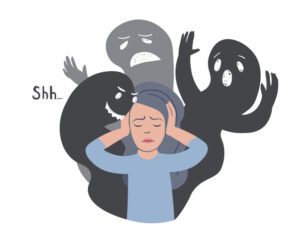 I’m sure most of you have heard the word schizophrenia doing the rounds lately, more specifically in the news with regards to the tragic events that unfolded in Bondi, New South Wales in April 2024. But you may find yourself asking what exactly is Schizophrenia? Unfortunately, the news and social media have also been plagued with misinformation about the mental illness.
I’m sure most of you have heard the word schizophrenia doing the rounds lately, more specifically in the news with regards to the tragic events that unfolded in Bondi, New South Wales in April 2024. But you may find yourself asking what exactly is Schizophrenia? Unfortunately, the news and social media have also been plagued with misinformation about the mental illness.
Let’s have a deeper look at an overview of schizophrenia, it’s symptoms, treatment and its link to dangerous and aggressive behaviour.
Schizophrenia is a psychiatric illness affecting around 1% of the population. It is a serious mental illness in which the individual interprets their reality abnormally and may have a distorted sense of what is real and what isn’t. It is essentially an illness of the brain, with its roots in the biological functions of the brain. (Livingwithschizophrenia, 2024) It is a complex psychiatric illness requiring a multi-disciplinary treatment approach and various community resources to treat and manage it. It is unfortunately a chronic and enduring illness and usually requires life-long treatment and support.
But how exactly does it present and how do we identify it?
Schizophrenia is comprised of what we refer to as both positive and negative symptoms.
Positive symptoms
These are usually present during a psychotic episode. A psychotic episode is comprised of hallucinations and delusions:
- In Schizophrenia, usually auditory (voices) and/or visual hallucinations,
- Delusions are rigid thoughts and beliefs that the individual is something that they aren’t such as an individual believing that they are God, or mighty and a superhero, as well as,
- Disorganised thoughts and behaviour.
Negative Symptoms
These can be more subtle and may have been present before the individual became “sick”: They are harder to treat and harder to identify and may often initially appear to others as a depression:
- Demotivation and apathy,
- “Absent” or blunted emotional responses,
- Social withdrawal and isolation,
- Reductions in speech such as not initiating conversation, giving one-word answers,
- Impaired attention and concentration,
- Loss of interest in pleasurable activities (anhedonia)
An individual with negative symptoms may be less likely to ask for help as the symptoms are usually less disruptive and possibly not even as noticeable. However, it is important that the individual still receives assistance during this stage and that they are monitored carefully by their healthcare providers and family. Early intervention in treating schizophrenia is extremely important and can lead to a better prognosis resulting in less impairment of functioning, and disruptive behaviour. Other symptoms that can appear include paranoid and persecutory delusions, disorganised thoughts, speech or behaviour as well as slow or poor movement, no speech and a seemingly inability to perform day-to-day tasks.
But what about dangerous and violent behaviour?
Dangerous behaviour and schizophrenia
Unfortunately, schizophrenia has been reported to increase your risk of violence in the form of homicide and suicide. With regards to suicide, the risk is not necessarily more so than the general population (American Psychiatric Association, 2024). With regards to violent behaviour, Huang et al. (2022) reported that meta-analysis demonstrated that schizophrenia spectrum disorders are associated with a heightened risk of violent offending with up to 20% of patients with schizophrenia acting violently in a 6-month period. Individuals that are paranoid and struggle with paranoid delusions may be particularly guarded and have a need to protect themselves as they can be so mistrustful of their environment and others. They often perceive others as out to get them and may defend themselves against these perceptions.
Research shows that a small number of individuals diagnosed with schizophrenia do become violent when they are suffering from the acute symptoms of psychosis. This is because of the influence of the hallucinations and delusions on their thinking. However, what places an individual at significantly higher risk is when an individual with schizophrenia abuses alcohol or drugs.
There are also other risk factors associated with schizophrenia and dangerous behaviour: (Livingwithschizophrenia, 2024)
Risk factors for dangerous behaviour
- A previous history of threats or suicide or any attempts,
Historical and background information can often be our best predictor of behaviour moving forward. An individual that has previously been violent, threatens violence or has harmed themselves or threatened suicide has a greater risk of doing it again especially if not treated.
- Noncompliance to meds
Individuals on medication, possibly antipsychotics, may struggle with side effects and may not want to take their medication. They may also mix their medication with drugs and alcohol resulting in not feeling well and therefore stopping their medication. If they struggle with paranoia, they may also not trust the drugs or the health professional that prescribed them.
Unfortunately, non-compliance to medication can cause a relapse as well as treatment resistance.
- Drugs and alcohol
As mentioned, these individuals often abuse drugs and alcohol as a means to escape their reality and for some, the overwhelming and scary voices. Unfortunately, drugs can also cause hallucinations as well as further mental health care difficulties. And they may even prevent the medication from working effectively.
- Poor supervision with those with the illness
Often individuals with schizophrenia require ongoing supervision of their medication as well as their behaviour. Unfortunately, this is not always possible, and they may find themselves out on the street, or living in neglectful circumstances.
- Comorbidity
The presence of other mental illness, as well as poor insight, high levels of impulsivity, poor global cognition as well as psychopathy (Huang et al. 2022).
So how do we treat schizophrenia and minimise the risk of aggressive behaviour?
Treatment
Treatment is best in the form of both medication and psychotherapy.
If you suspect that you may be struggling, then the first step is to get a formal diagnosis so that you can receive the correct treatment. You can visit your general practitioner and they will assess you and decide if you need a specialist referral to a psychiatrist and psychologist. You may need to undergo a physical examination as well as routine tests and screenings in order to rule out a medical condition that may present with similar symptoms (Mayo Clinic, 2024). From there the psychiatrist and psychologist will obtain all the necessary information to assist in a diagnosis. This can take some time and is not as a simple as a blood test result. They will also recommend the necessary medication and therapy.
It’s also important to have family support and involve your loved ones in your treatment. Family therapy can provide support and education to the individual and their family (Mayo Clinic, 2024). Social skills training can also assist in improving communication and social interactions (Mayo Clinic, 2024). Reach out to support groups in your community and find out what programs are being offered. You do not need to cope with this on your own and support is available.
Dr Pauline Baleta has been treating individuals with schizophrenia for the past 17 years in both acute mental health care settings as well as an outpatient. If you or a loved one suspect that you may be struggling with schizophrenia, please feel free to book here and start your treatment. To make an appointment with Dr Pauline Baleta try Online Booking. Alternatively, you can call Vision Psychology Brisbane on (07) 3088 5422.
References
American Psychiatric Association, (2024). What is schizophrenia? Obtained from the World Wide Web: https://www.psychiatry.org/patients-families/schizophrenia/what-is-schizophrenia
Livingwithschizophrenia (2024) Schizophrenia and Dangerous Behaviour – Living With Schizophrenia (livingwithschizophreniauk.org)
Huang ZH, Wang F, Chen ZL, Xiao YN, Wang QW, Wang SB, He XY, Migliorini C, Harvey C, Hou CL. Risk factors for violent behaviors in patients with schizophrenia: 2-year follow-up study in primary mental health care in China. Front Psychiatry. 2023 Jan 20;13:947987. doi: 10.3389/fpsyt.2022.947987. PMID: 36741582; PMCID: PMC9895824.
Mayoclinic, (2024). Schizophrenia. Obtained from the World Wide Web: https://www.mayoclinic.org/diseases-conditions/schizophrenia/diagnosis-treatment/drc-20354449

